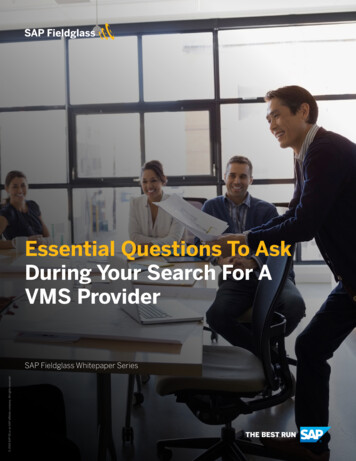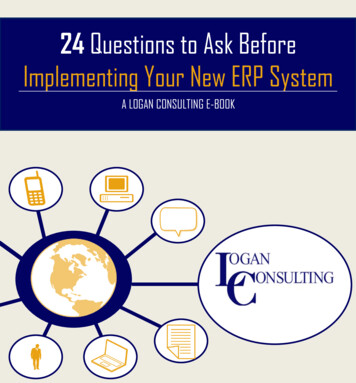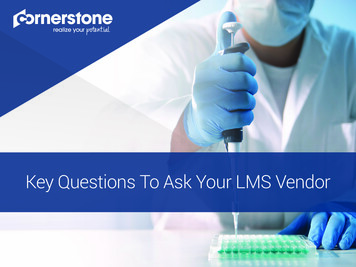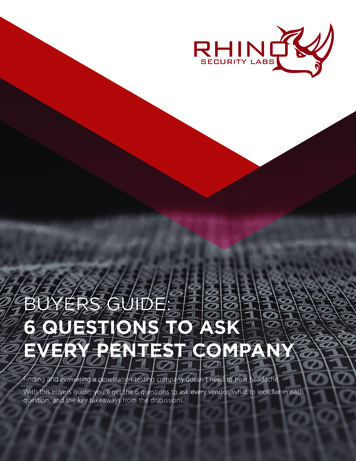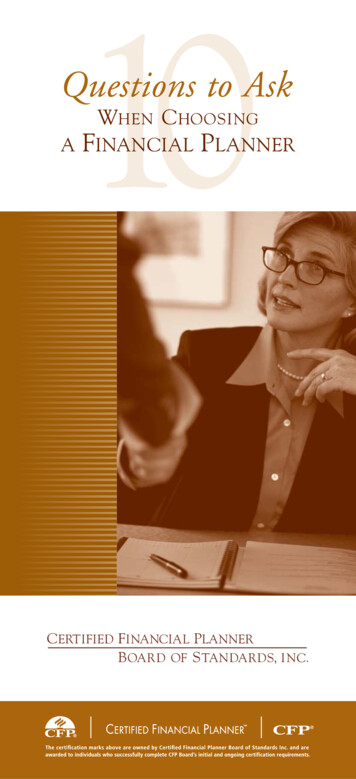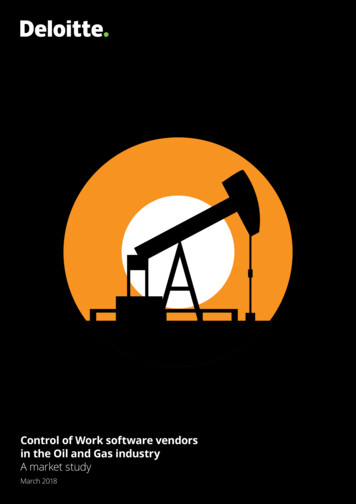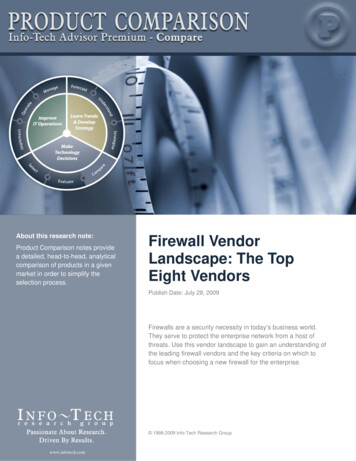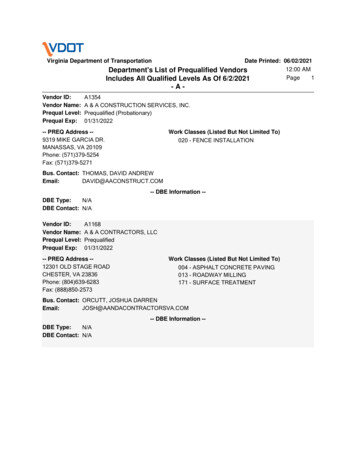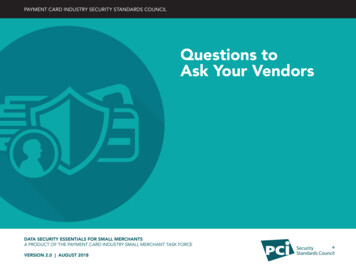
Transcription
PAYMENT CARD INDUSTRY SECURITY STANDARDS COUNCILQuestions toAsk Your VendorsDATA SECURITY ESSENTIALS FOR SMALL MERCHANTSA PRODUCT OF THE PAYMENT CARD INDUSTRY SMALL MERCHANT TASK FORCEVERSION 2.0 AUGUST 2018
INTRODUCTION.1VENDORS AND SERVICE PROVIDERS .2QUESTIONS .3APPENDIX: Which questions are applicable to which vendors/solution providers? .9
IntroductionQuestions to Ask your Vendors is a supplement to the Guide to Safe Payments, partof the Data Security Essentials for Small Merchants. By providing questions to ask yourvendors and service providers, this is intended to assist with your understanding of howthose entities support the protection of your customers’ card data.Please refer to the Guide to Safe Payments and the other Data Security Essentials forSmall Merchants at the following:RESOURCEURLGuide to Safe Small Merchant Guide toSafe Payments.pdfCommon Payment mall Merchant CommonPayment Systems.pdfGlossary of Payment andInformation Security ll Merchant Glossary ofPayment and Information Security Terms.pdfEvaluation /This tool is provided for merchant information only. An option formerchants is to use it as a first step to gain insight about securitypractices relevant to the way they accept payments, to provide theirinitial responses, and to see their results.Vendors and Service Providers, and How They FunctionSmall businesses/merchants may come into contact with a number of payment vendorsor services providers, and it is important for merchants to understand the type ofvendor they are working with and ensure the vendor has taken appropriate steps toprotect card data.The table on page 2 describes the most common types of payment vendors andservice providers and what merchants should look for with each vendor.The table starting on page 3 provides merchants with questions they can ask theirvendors or service providers to help them understand what the vendor’s or serviceprovider’s role is in protecting card data.Data Security Essentials for Small Merchants:Questions to Ask Your Vendors August 2018Copyright 2018 PCI Security Standards Council, LLC. All Rights Reserved.1
Vendors and Service ProvidersThe table below describes the most common types of payment vendors andservice providers, their functions, and PCI standards or programs that apply to thosefunctions. See the Appendix for a list of questions applicable to each type of vendoror service provider.Type of Vendor/Service ProviderFunctionPCI Standardor ProgramLook For:Payment application vendorSell and support applications thatstore, process, and/or transmit cardholder data.Payment ApplicationData SecurityStandard (PA-DSS)Application is on theList of PCI PA-DSS of Validated Payment ApplicationsPayment terminal vendors,payment solution vendorsSell and support devices or solutions(e.g., payment terminals or encryption solutions)used to accept card payments.PIN TransactionSecurity (PTS)Payment terminal is on theList of PCI Approved PTS DevicesEncryption solution is on theList of PCI P2PE SolutionsPayment processors,e-commerce payment serviceproviders, payment gateways,contact centersStore, process, or transmitcardholder data on your behalf.PCI Data SecurityStandard (PCI DSS)E-commerce hosting providersHost and manage your e-commerce server/websiteand/or develop and support your website. Thisprovider may only provide hosting services or mayadditionally perform payment processing.Providers of software as a service,cloud-based hosting providerDevelop, host and/or manage your cloud-basedweb application or payment application (e.g., onlineticketing or booking application).Providers of services thatmay help you meet PCI DSSrequirementsManage/operate systems or services on your behalf(e.g., data centers, co-location center providers,and information technology services such as firewallmanagement, patching, or anti-virus services).Integrators/resellersInstall merchant payment systems.Data Security Essentials for Small Merchants:Questions to Ask Your Vendors August 2018PCI Point-to-PointEncryptionAsk for their PCI DSS Attestation of Complianceand whether their assessment included the serviceyou are using.Is Service Provider on one of these lists:MasterCard’s List of Compliant Service ProvidersVisa’s Global Registry of Service ProvidersVisa Europe’s Registered Merchant AgentsQualified Integratorsand Resellers (QIR)Ask whether the vendor is a PCI QualifiedIntegrator or Reseller (QIR). Vendor is on theList of PCI QIRs.Copyright 2018 PCI Security Standards Council, LLC. All Rights Reserved.2
GlossaryThe table below contains a series of questions for merchantsto ask their vendors/service providers to determine whetherthe proper controls are in place to protect card data.Ask:Note: If a vendor or solution provider does not provide you with positiveanswers to applicable questions in this table, you should stronglyconsider looking for another vendor or solution provider.Analyzing Vendor Answers Helpful Steps and Additional Information for MerchantsIs the vendor’s solution or product secure?1. Does the vendor’s solution/product securelycapture and transmit payment card information?When a product or service is listed by PCI SSC orthe payment card brands, it means that product/service has been validated according to a PCIsecurity standard. Inclusion on these listings is anindication that the vendor or service provider hastaken extra steps to provide secure products orservices.For solutions or products with payment terminals or payment applications: Check here to see whether the payment terminal is PCI PTS approved:List of PCI Approved PTS DevicesAND/OR Check here to see whether the payment application is PCI PA-DSS validated:List of PCI PA-DSS of Validated Payment ApplicationsOR Check here to see whether the encryption solution is PCI P2PE validated:List of PCI P2PE Validated SolutionsFor card-not-present payment transactions (including e-commerce,mail order/telephone order): Check here to see whether the service provider is a PCI DSS Compliant Service Provider:MasterCard’s List of Compliant Service ProvidersVisa’s Global Registry of Service ProvidersVisa Europe’s Registered Merchant AgentsOR Check here to see whether the payment application is PCI PA-DSS validated:List of PCI PA-DSS of Validated Payment ApplicationsData Security Essentials for Small Merchants:Questions to Ask Your Vendors August 2018Copyright 2018 PCI Security Standards Council, LLC. All Rights Reserved.3
QuestionsAsk:Analyzing Vendor Answers Helpful Steps and Additional Information for MerchantsIs the vendor’s solution or product secure?2. Does the vendor’s product/solution storepayment card information in my systems (forexample, those in my store/shop locations, withmy web application, or with my e-commercewebsite). If so, how does that product/solutionprotect the data?Products or solutions that tokenize or encrypt payment card information provide a way for merchants to securecard data. See the Guide to Safe Payments for more information about encryption and tokenization.3. Does the vendor’s product/solution protectpayment card data during transmission withstrong encryption?Encryption converts information into a format that is unusable except to holders of a specific digital key.Securing payment card data in this way makes it less likely that it can be stolen and used fraudulently.For payment terminals & integrated payment terminals: If you can, select from the List of PCI P2PE Validated Solutions for a product/solution in which card data isencrypted. Use of a PCI listed P2PE solution means payment card data is protected soon when you receive itand as it travels through your network and to your payment processor.For payment applications: Check with your vendor, reseller, or integrator that the payment application is PCI PA-DSS validated.For hosted e-commerce websites, web applications or payment applications: Ask your service provider whether they use a secure version of Transport Layer Security (TLS) to protecttransmissions of payment card data.4. Is the vendor’s solution/product required to beintegrated with my other systems—for example,with my payment terminals, accounts receivable,or other systems that contain cardholder data?A stand-alone or isolated payment terminal is simpler to secure than a more complex payment system that mayhave many connected systems.If the solution requires integration with other systems in your environment, consider the following: Does it simplify your processing environment? How does it add value to your business? Do you need this type of solution? Consider that it will increase your business risk andcomplexity by making your cardholder data environment larger and harder to secure.You may want to consider another vendor or product unless there is a strong business requirement for having amore sophisticated solution with connections to your other systems.Data Security Essentials for Small Merchants:Questions to Ask Your Vendors August 2018Copyright 2018 PCI Security Standards Council, LLC. All Rights Reserved.4
QuestionsAsk:Analyzing Vendor Answers Helpful Steps and Additional Information for MerchantsDoes the vendor help me securely install or set up the product or solution?5. If the vendor is installing a payment applicationor system in my environment, ask: Is the vendor a PCI Qualified Integratoror Reseller? If the vendor does not install the paymentapplication or system, are you expected toinstall it?6. Regardless of whether the vendor is a QIR, ifthe vendor is installing a payment application orsystem, ask: Does the vendor support me during installationand ensure installation is done securely? Does the vendor provide an implementationguide to help me set up the application securely?QIRs are integrators and resellers specially trained by the Council to address critical security controls whileinstalling merchant payment systems. QIRs reduce merchant risk and mitigate the most common causes ofpayment data breaches by focusing on critical security controls.Check here to see whether the vendor is listed:List of PCI QIRs.Improper installation can make your system vulnerable to compromise. The vendor should either install theapplication or system in a secure manner or help you by providing you with implementation guidance. Theimplementation should cover, at a minimum, how to change default passwords and establish strong ones, how tomanage patches and updates, and a description of how the vendor uses remote-access software to access yourbusiness (and what your role is with such software). More detail about each of these three areas is included atQuestions 7-9 below.Data Security Essentials for Small Merchants:Questions to Ask Your Vendors August 2018Copyright 2018 PCI Security Standards Council, LLC. All Rights Reserved.5
QuestionsAsk:Analyzing Vendor Answers Helpful Steps and Additional Information for MerchantsDoes the vendor help me securely install or set up the product or solution?7. Does the vendor provide support duringinstallation or set-up of the product/solutionto help me change vendor-supplied defaultpasswords? Does the vendor help me set up strongpasswords?Weak passwords and vendor-supplied default passwords comprise one of the three leading causes of merchantdata breaches (the other two are covered at Questions 8 and 9 below).Vendor-supplied default passwords are those that come with a product or solution, such as the first-timepassword for a new system or application, a merchant hosted e-commerce website, or hotel booking application.These vendor-supplied default passwords are often simple and commonly known to hackers (like “admin,”“password,” or the vendor company or product name). These passwords should be changed to a strongpassword when the product is installed or set-up for the first time. If you change it to a simple password (like“12345”), it will make it easy for a hacker to get into your payment systems.If the vendor does not change default passwords when installing or setting up the application or system, theyshould provide you with implementation guidance that explains how to change these passwords and how toestablish strong passwords.Does the vendor securely support and maintain the product/solution?8. To understand patches (software security“fixes”) and updates for the product/solution,ask the vendor: What support and guidance does the vendorprovide to my business during the patching/updating process? Are patches and updates provided and installedautomatically by the vendor? Am I expected to obtain and install thosepatches/updates? How does the vendor notify me when patches/updates are available or have been automaticallyapplied? For hosted e-commerce websites, webapplications, or payment applications, does thevendor take responsibility for patching/updatingthe solution they provide to me?Unpatched applications and systems comprise one of the three leading causes of merchant data breaches (theother two are covered at Questions 7 and 9).Unpatched systems often contain vulnerabilities that hackers use to gain access to your payment card data. Thevendor should provide on-going maintenance and support for their applications or systems via software updatesand security patches (software security “fixes”). For example, the vendor should send you patches when needed,notify you when they are available, and provide guidance about
web application or payment application (e.g., online ticketing or booking application). Providers of services that may help you meet PCI DSS requirements Manage/operate systems or services on your behalf (e.g., data centers, co-location center providers, and information technology services such as

